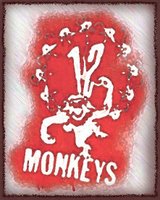Shock the monkey
 I've been thinking about anarchy. Why would someone smart and (sometimes) compassionate like Emma Goldman advocate complete chaos? Recently it's become more obvious that organization only leads to organized destruction, even on a planatary scale, so maybe she got it right. Aren't each and every one of us, with enough time to read what's going on in the world (because you're not looking for a job) saying, "What the frak?"
I've been thinking about anarchy. Why would someone smart and (sometimes) compassionate like Emma Goldman advocate complete chaos? Recently it's become more obvious that organization only leads to organized destruction, even on a planatary scale, so maybe she got it right. Aren't each and every one of us, with enough time to read what's going on in the world (because you're not looking for a job) saying, "What the frak?"Well, something probably will survive. It may not be the humans, but then maybe we don't deserve to survive. Those of you nodding your head in agreement right now are the reason we're in this state. Forget the self-pity. Get off your butt and go do something about it. Let's change the world before it's too late. You want a hero? Look at Peter Gabriel, Bono or Desmond Tutu. It takes each of us to make a difference.
You can do it!



6 Comments:
Anarchy doesn't necessarily equal chaos.
OK, I guess the difference is that anarchy is political chaos?
Under my definition, any form of anarchy (which includes our current government because 1) doing nothing, 2) doing corruption, or 3) doing things opposite of defined duties all qualify) causes the government to avoid it's role as protector of individual rights. If my rights are not protected, the result is chaos (again my definition).
How would you define an anarchical situation that wasn't chaos? The role the rights protector (legislature, police, courts, prisons, etc.) must be performed by another entity. Or do we just accept the vulgarity of human nature?
I can't bring to mind any government ever that wasn't anarchic under your definition.
So instead: how would you define a government situation that wasn't anarchy?
The assumption always comes back to this: order can only be derived from an explicitly structured and enforced power system.
Human nature is both vulgar and exquisite. That's reality, whether we like it or not. Of course we must accept reality. First. Before we start making decisions and judgements about it.
You mean you can't bring to mind any administration that wasn't anarchic maybe, but our government is not based on anarchy. In its purest form, our government is protection of individual rights. The most basic right is freedom which includes the freedom to break the law, but the law is there to protect others from your freedoms.
There's no way to protect people from injustice, but we use the law to punish people and try to make the punishment fit the crime to dissuade others from doing the same. The only protections for corporations are the ones that ultimately protect the individuals of the corporations because a corporation is not an entity that should be protected by the law even if some wacko Supreme Court Justices seem to think so.
Every single law boils down to this: Who does it protect? From traffic tickets, murder, embezzlement, etc. If it's not protecting someone's rights, it shouldn't be a law.
Gay marriage? - No.
anti-Immigration? - No.
No child left behind? - No.
Spying without court approval? - No.
Environment protection? - Yes.
Civil rights protection? - Yes.
Corportate regulation? - Yes.
Funding public schools? - Yes.
Universal Health Care? - Yes.
Where's my government?
Bear with my feeble brain, if you would: I'm not sure what you meant by the *yesses* and *noes.*
eg gay marriage: the U.S. constitutional amendment being considered is to prevent gay marriage. This doesn't protect gays who wish to marry.
Advocates of the amendment say it will *protect* marriage. Me, I can't see why legalizing gay marriage would harm hetero marriage. Generally, expanding or clarifying any civil right wouldn't automatically harm that civil right, but rather do the opposite. The advocates, I think, actually fear something else.
What laws exist that don't protect rights?
Are you saying that if it protects a corporation or church or other non-human, it shouldn't exist?
Yes, a law that outlaws marriage between any two people does not protect a right. A law that makes English our national language does not protect a right. A law that outlaws burning the flag does not protect a right.
Freedom of religion means freedom from religion too. You can't protect a corporation or a religion. You can only protect individuals from corporations or religions. If you protect an individual's rights, then you protect his/her rights to be a member of a religion/corporation. That's the only protection they should get (no tax exemptions or subsidizations).
Protection of Marriage is not about protecting any individual's right to marry. It's a pasteurized way to hate. It is sickening that this supposedly comes from Christians, eh? There are a few things still publicly acceptable to hate: 1) gay people, 2) fat people (or anyone with a perceived lack of control - smokers, drug users, alcoholics, etc.), 3) Arabs (or brown people in general), 4) Jewish people (for killing Jebus), 5) bad people (Nazis, pedophiles, murderers, rapists, etc. - this is why the death penalty is ok)
Post a Comment
<< Home